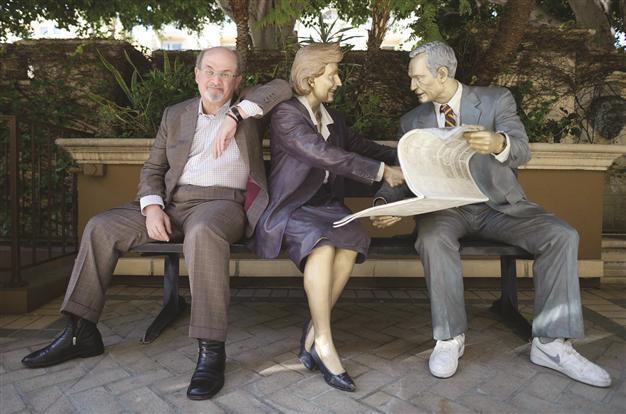Rushdie relives magic of ‘Midnight’s Children’
ISTANBUL - The Associated Press

Salman Rushdie poses for a picture during ‘Midnight’s Children’ press day. AFP photo
Thanks to the printed word and the moving image, Salman Rushdie has recaptured the worst part of his life and relived one of the best.Last fall, the 65-year-old author published the best-selling memoir “Joseph Anton” about his years in hiding that followed the 1988 publication of “The Satanic Verses” and the call for his death by Iran’s Ayatollah Ruhollah Khomeini.
Rushdie is now promoting the film adaptation of his breakthrough novel, “Midnight’s Children,” winner of the Booker Prize in 1981 and one of the most highly praised works of fiction of its time.
Condemned by the Ayatollah
Much of the world only learned about Rushdie after “Satanic Verses,” which was condemned by the Ayatollah and others as blasphemous and made him an author far more talked about than read. Forced to live under an assumed name, Joseph Anton, he felt as if he had lost control of his own life’s narrative. In his memoir, he turns himself into a kind of literary character, referring to himself in the third person, and uses narrative to get his own back.
In the literary community, Rushdie’s had long been an honored name because of “Midnight’s Children.” It is about Saleem Sinai, a child born at the very moment of India’s independence from Britain, and his terrifying and fantastic adventures that join his story to the story of his country. Widely regarded as a landmark of neo-colonial fiction, the novel follows Saleem through India’s independence and internal conflict, war with Pakistan and the 1970s “State of Emergency” declared by then-Prime Minister Indira Gandhi.
Until now, none of Rushdie’s books had been made into movies and “Midnight’s Children” seemed an unlikely candidate to go first.
When Rushdie first met with director Deepa Mehta, they were supposed to discuss a more recent novel, “Shalimar the Clown.” But Mehta also asked about the rights to “Midnight’s Children.” Rushdie, surprised by her interest, agreed.
“It was instinct,” he said. “It was clear from talking to her how much the book meant to her.”
















